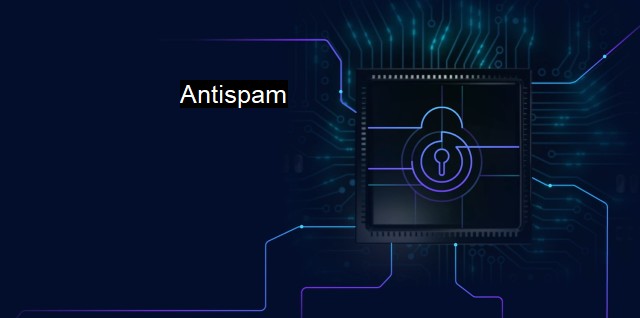What is Antispam?
Keep Your Inbox Healthy with Antispam: Protecting Your Data from Online Threats
Antispam is a technologically driven mechanism, critical to cybersecurity, explicitly designed to prevent, quarantine, and eliminate unwanted advertisements referred to as 'spam.' The term spam refers to the massive volume of intrusive or irrelevant data often aimed at promoting specific services, products, or information. In many instances, this data acts as breeding grounds for viruses, malware, adware, ransomware, and other harmful cyber threats.Spam, particularly emails, can reach an alarming volume occupying a significant proportion of internet traffic. Such pointless communications can invade valuable memory spaces, generate congestion in networks, and cause digital environments to malfunction or run on slower than the routine pace; an issue with high-stake consequences for businesses and large organizations.
Antispam arises as the ultimate solution to detect and block these spam emails. It operates under multiple carefully constructed layers of tools strategically synchronized to optimize its effect engulfing an array of checks to ensure accuracy and efficiency in spam detection regardless of their sources and delivery methods.
Among the many checks in place are the Spam filters that automatically validate the emails a typical user receives. By comparing predetermined blacklists that include known sources of spam and advanced heuristics that evaluate email characteristics, these filters can effectively flag potentially harmful messages and hence, quarantine or delete them.
Other widely commended strategies combating spam include Internet Service Provider (ISP) email filtering, behavioral-based systems, and honeypots, which are effectively used to divert attention from useful data away. Compellingly, some ISPs leverage aggressive techniques with significantly high success records to even scan outgoing emails to mitigate possibilities of spam.
In the dynamic cybersecurity landscape, the role and importance of antispam are bound to and significantly impact two other key constituents: antivirus and anti-malware tools. When linked together, these solutions integrate the cybersecurity architecture robustly fortifying it against potential threats.
An antivirus is a program that scans, detects, and attempts to remove malicious codes premeditatedly designed to manipulate computing environments. Often misinterpreted as the panacea to any potential cyber threat, it's crucial to understand that not all antivirus software can fully protect against spam despite some possessing certain elements of antispam properties.
Antivirus is mainly designed to mitigate threats that have intercepted a device or network without a user's subscription while spam emerges from interactions between a user and the internet, such as access to unsolicited emails, unintended visits to untrusted sites, or unknowing downloads of suspicious files.
Anti-malware, a form of antivirus, zero in on invasive software such as trojans, worms, and ransomware. Some popular anti-malware software even hold components catering to the detection of phishing emails, a frequent delivery medium for destructive payloads posing significant security threats.
Antispam, antivirus, and anti-malware work in harmony with each other, constantly improving their algorithms, heuristics, and capabilities to protect users and their devices against the onslaught of cyberthreats. Together, they form an integrated cybersecurity framework, fine-tuning their functionality to stay a step ahead of the evolving threat landscape in a collective stride safeguarding against variants of malware hacks and data breaches and ensuring secure digital experiences.
Monitoring email exchanges are only part of the antispam equation, although a significant one characteristically noteworthy considering the higher percentage weights of email-induced cyberattacks. Concurrent advancements in technologies expand platforms for these threats that facilitate introducing antispam elements to other platforms where users typically interact, like online games, social networks, instant messaging apps, the Internet of Things (IoT) amongst others to strengthen cybersecurity.
There's more to antispam than clearing email inboxes. It serves as a vital line of defense against conditions that could potentially compromise the integrity, confidentiality, and availability of valuable data assets in the cyber world in which these mechanisms are prioritizing the safety of users by endeavoring preventions more than cures.
Sophisticated selection of our cyber protection tools with accommodating synchronizations, visible in the companionships antispam, antivirus, and anti-malware share, is turning the cybersecurity equation in favor of the innocent users manifesting increasingly improved security callouts synchronized with digital transformations in the world that seem only likely to expand in time spaces ahead.

Antispam FAQs
What is antispam?
Antispam refers to a set of techniques and technologies used to prevent unsolicited and unauthorized emails, also known as spam, from reaching users' inboxes.Why is antispam important in cybersecurity?
Antispam is an essential security measure in cybersecurity because spam emails often contain malicious links or attachments that can compromise a user's system, steal sensitive information, or launch a cyberattack.What are some common antispam techniques?
There are several antispam techniques, such as content filtering, sender authentication, blacklists, whitelists, and reputation-based systems. These techniques help identify and block spam emails based on their content, source, and reputation.How can I choose the right antispam solution for my business?
Choosing the right antispam solution depends on your organization's needs and requirements. It's essential to consider factors such as the size of your business, the volume of spam emails you receive, and the level of protection you need. You can consult with a cybersecurity expert or a trusted vendor to help you select the most appropriate antispam solution for your business.Related Topics
Email security Email filtering Email protection Email encryption Email authentication
| | A | | | B | | | C | | | D | | | E | | | F | | | G | | | H | | | I | | | J | | | K | | | L | | | M | |
| | N | | | O | | | P | | | Q | | | R | | | S | | | T | | | U | | | V | | | W | | | X | | | Y | | | Z | |
| | 1 | | | 2 | | | 3 | | | 4 | | | 7 | | | 8 | | |||||||